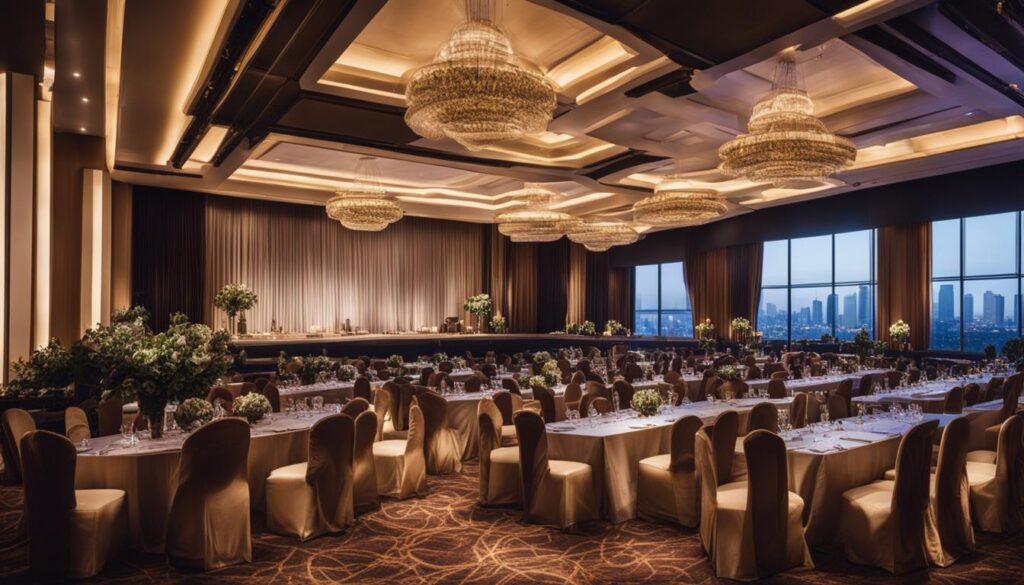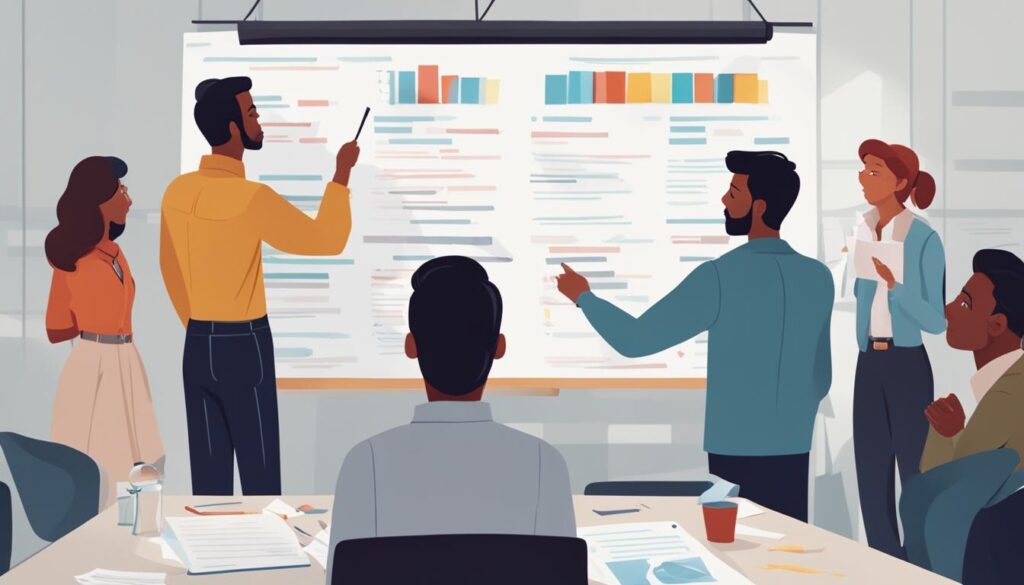We may earn money or products from the companies mentioned in this post.
Choosing the perfect venue and setting it up for your event is a crucial step to creating a successful experience. The right location and design can elevate your event to new heights and leave a lasting impression on your guests. On the other hand, a poorly selected venue or inadequately planned setup can significantly impact attendance and overall satisfaction. Here’s our comprehensive guide to assist with your venue choice and setup process.
Key Takeaways
- Selecting the right venue is vital to the success of your event.
- Consider the key factors such as size, capacity, location, and amenities during your venue selection process.
- Exploring venue options and assessing their layout is essential to finding the perfect venue.
- Designing the event space is crucial and requires careful consideration of furniture, decor, lighting, and audiovisual setup.
- Pay close attention to technical aspects such as sound systems, stage setup, and electrical requirements.
Factors to Consider When Choosing a Venue
When planning an event, one of the most critical decisions you’ll make is choosing the right venue. The venue sets the tone for your event and can make or break its success. In this section, we’ll discuss some essential factors to consider when choosing a venue to help you make the right decision.
1. Capacity and Size
The first thing to consider is how many guests your event will have. You’ll want to find a venue that can comfortably accommodate your guests without feeling too small or too large. It’s also essential to consider the layout of the space, as an overly spacious venue can make your event feel empty, and a cramped one will make your guests uncomfortable.
2. Location
The location of your event can significantly impact attendance, so it’s important to choose a venue that is easily accessible and convenient for your guests. Consider factors such as parking availability, public transportation access, and proximity to hotels and other attractions.
3. Amenities
When selecting a venue, it’s crucial to consider the amenities that it offers. Does it have adequate restroom facilities? Is there a kitchen or catering service available? What about audiovisual equipment or Wi-Fi access? Thinking about these amenities beforehand can help you choose a venue that meets all of your event needs.
4. Ambiance
The ambiance of a venue can make a significant difference in the success of your event. A venue that is well-decorated and has a beautiful atmosphere can set the tone for a memorable evening. However, it’s essential to ensure that the ambiance aligns with the theme and objectives of your event.
5. Cost
Cost is an important consideration when selecting a venue. Before making any decisions, create a budget for your event and stick to it. Keep in mind that venues may have hidden costs, such as cleaning fees or additional charges for equipment rental, so be sure to ask for a detailed pricing breakdown when making inquiries.
6. Reputation
Finally, consider the venue’s reputation when making your decision. Look for reviews and testimonials from previous clients to get an idea of their experiences. Feedback from others can provide valuable insights that may sway your decision in one direction or another.
By keeping these factors in mind, you’ll be better equipped to choose the right venue for your event.
Exploring Venue Options and Layout
After considering the key factors in choosing the right venue, it’s time to explore different options and evaluate their layouts. The layout of the venue is an important consideration as it can significantly impact the flow of the event and guest experience. Here are some tips to help you find the perfect venue:
- Conduct a Site Visit: Schedule a site visit to explore the venue and assess its layout. This will help you visualize how the space can be utilized to suit your event’s needs. It’s also an excellent opportunity to ask questions and clarify any doubts with the venue staff.
- Consider the Event Flow: The event flow determines how guests will move through the event space. The venue’s layout should complement your desired event flow. Consider factors such as the location of the entrance, stage, dance floor, and seating arrangement.
- Assess the Space Capacity: Ensure that the venue can accommodate the expected number of attendees comfortably. It’s important not to choose a venue that is too small, as it can negatively impact guest experience and safety. Alternatively, selecting a space that is too large can make your event look sparsely attended.
- Take Note of Venue Amenities: Depending on your event requirements, you may require specific amenities such as audiovisual equipment, lighting, or catering facilities. Ensure that the venue you choose has the necessary amenities to avoid last-minute arrangements.
- Consider the Venue’s Aesthetic: The venue’s aesthetic ties into your event theme and brand, so it’s essential to choose a space that aligns with your vision. Consider factors such as the color scheme, decor, and lighting.
By exploring different venue options and assessing their layouts using the above factors, you can find the perfect venue that aligns with your event objectives and guest needs.
Designing the Event Space
After you’ve chosen a suitable and functional venue for your event, the next step is to design the event space. The overall event design can significantly affect the attendee experience and contribute to the success of your event. In this section, we will provide you with a venue setup checklist to ensure that every design aspect of the event space is thoughtfully considered.
Venue Setup Checklist
The following checklist covers essential aspects of designing an event space:
| Design Aspect | Details to Consider |
|---|---|
| Furniture Arrangement |
|
| Lighting Design |
|
| Decor Selection |
|
| Audiovisual Setup |
|
By checking off each item on this venue setup checklist, you can ensure that every detail is carefully considered and executed according to your overall event design. With a well-designed event space, your attendees are bound to have a memorable experience.
Technical Considerations for Venue Setup
When setting up your event venue, it’s important to consider the technical aspects to ensure a seamless experience for your guests. Here are some key technical considerations to keep in mind:
Sound System
Whether you’re hosting a conference, concert or wedding reception, having a quality sound system is crucial. Make sure to test all the speakers and microphones beforehand to avoid any technical difficulties during the event. It is essential to have a sound technician present to ensure that all sound levels are correct and the audio quality is top-notch.
Stage Setup
The stage is the focal point of your event, so it’s important to ensure that it is set up correctly. Factors such as stage size, height, and backdrop can significantly impact the overall experience. Make sure to discuss these requirements with your venue and stage suppliers to guarantee a seamless setup.
Lighting
Lighting can set the mood of the event and enhance the visual appeal of the venue. Consider the type of lighting that will best suit your event and make sure to work with a professional lighting designer or technician to ensure that the lighting is appropriate and meets safety standards.
Electrical Requirements
Ensure that your chosen venue has the necessary electrical connections and outlets to support your event’s power needs. It’s vital to conduct an electrical load test if you plan to use multiple electrical appliances simultaneously.
AV Setup
If you plan to use audiovisual equipment such as projectors, screens, or monitors, it’s essential to test the equipment and ensure that it is compatible with your venue’s system. Working with a professional AV supplier is recommended to ensure that all equipment is set up correctly and operates smoothly throughout the event.
Ensuring a Smooth Venue Setup Process
Once you have chosen the perfect event venue, it’s time to move on to the venue setup process. This can be a daunting task, but with a well-planned venue setup checklist, you can ensure a smooth and efficient setup process. Below are some key steps to consider:
- Coordinate with vendors and suppliers – Make sure that all vendors and suppliers are aware of the timeline and setup requirements. Share the venue layout and technical specifications to ensure that everyone is on the same page.
- Check the logistics – Ensure that you have the necessary resources such as transportation, storage space, and utilities. Plan the delivery and setup logistics in detail to avoid any last-minute surprises.
- Prepare a detailed timeline – A timeline is critical to ensure that all tasks are completed on time. Provide timelines to all parties involved, including vendors, suppliers, and the venue staff.
- Assign responsibilities – Delegate responsibilities to specific team members and ensure that everyone knows their tasks and expectations. Assign a point person to oversee the venue setup process and act as the main point of contact.
The venue setup process can be stressful, but by following a comprehensive venue setup checklist, you can ensure that all aspects of the setup are taken care of. Remember to stay organized, communicate effectively, and be prepared for any unexpected challenges that may arise.
Considering the Venue’s Practicality and Accessibility
While selecting a venue for your event, practicality and accessibility are crucial factors to consider. You want to ensure that the venue is easily accessible to all attendees and offers convenient amenities. Here are some venue selection factors to keep in mind:
- Parking Facilities: Evaluate the venue’s parking infrastructure. Does the venue have ample parking space, or are you required to arrange off-site parking? Make sure that the parking area is well-lit and secure to ensure the safety of your attendees.
- Public Transportation Access: Consider the accessibility of the venue through public transportation. Is the venue located near bus or train stations? Ensure that your attendees have access to various transportation options to reach the venue without hassle.
- Accommodation Options: For events that run over several days, attendees may require lodging. Evaluate whether the venue offers lodging options or is near hotels and inns. Ensure that your attendees have convenient accommodation options available.
By factoring in practicality and accessibility during your event venue selection process, you can guarantee that your chosen venue is convenient and accessible for all attendees.
Conclusion
Choosing the right venue and setting it up flawlessly can make or break your event. By considering key factors such as location, capacity, amenities, layout, technical requirements, and practicality, you can ensure that your chosen venue aligns with your event objectives and guest needs.
Use this Guide as Your Reference
We hope that this comprehensive guide has provided you with valuable insights and practical tips to simplify your event planning process. From exploring various venue options to designing the event space and ensuring a smooth setup process, we’ve covered everything you need to know to make your venue choice and setup perfect.
Your Attendees Deserve the Best
Remember, your guests expect a memorable and enjoyable experience, and the venue choice and setup can greatly impact their perception of your event. By following the steps outlined in this guide, you can create a visually appealing, functional, and easily accessible event environment that exceeds your attendees’ expectations.
Thank you for choosing this guide as your reference. We wish you the best of luck in your event planning process and look forward to hearing about your successful event!
FAQ
What factors should I consider when choosing a venue?
When choosing a venue, you should consider factors such as size and capacity, location, amenities, and whether it aligns with your event objectives and guest needs.
How do I explore different venue options and evaluate their layouts?
To explore venue options, you can conduct research, visit potential venues, and assess their layouts to see if they suit your event requirements.
What should I consider when designing the event space?
When designing the event space, you should consider furniture arrangement, decor selection, lighting, and audiovisual setup to create a visually appealing and functional environment.
What technical considerations are important for venue setup?
Technical considerations such as sound systems, stage setup, and electrical requirements are important for a seamless venue setup process.
How can I ensure a smooth venue setup process?
To ensure a smooth venue setup process, you should coordinate with vendors and suppliers, manage logistics and timelines, and follow a step-by-step guide.
What practicality and accessibility factors should I consider when choosing a venue?
When choosing a venue, you should consider factors such as parking facilities, public transportation access, and accommodation options to ensure practicality and accessibility for all attendees.
Affiliate Disclosure: This post may contain affiliate links. If you purchase through our link, we may receive a small commission, but at no additional cost to you. For more information, please see our Disclosure statement.



